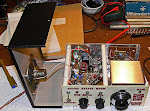I will be the first to admit that this is a very selfish point of view, but I really am quite annoyed (well as annoyed as I will allow myself to be over something which is a hobby/leisure activity) that the "powers that be" whoever they are, have turned one of the twice-yearly ROPOCO contests from a CW challenge to an SSB or phone one.
Especially ROPOCO1 (April) in which I have previously participated many times.
I am not a contester at all, but I really enjoy this particular challenge as it is, quite frankly, just that, a challenge.
What it challenges, from my own selfish point of view is one's CW sending and receiving ability/technique.
It does this in quite a different way to that of most if not all other contests in that _ACCURACY_ is prized above all else.
Most other contest have so many elements which are predictable (report, serial number, region, and so on) that "quantity" rather than "quality" carries enormous weight, whereas in ROPOCO accuracy is king.
Sending technique and accuracy is challenged. In other forms of amateur CW communications the odd sending error is normally of little consequence - the operator who knows he has made a mistake in transmission has to decide whether or not to correct that mistake, and if he decides to correct it, he has numerous methods open to him how to achieve that. In CW conversation, he will often just let the mistake go and rely on the operator at the other end picking up the error and dealing with it in his own way.
With ROPOCO this concept just doesn't work, and the challenge is for both the operator sending, and the operator receiving knowing how to deal with what they think might be a mistake in either transmission or reception. Mistakes lose points!
If you have never participated in ROPOCO this notion might be somewhat lost on you, but those of you who have will know exactly what I mean.
It could be argued, and I am sure that it will be, that this format should translate perfectly well to a "phone" format, and I am sure it will, but my point is that the corresponding challenge in speech communications is quite different to that in telegraphy.
For my money, I "they" wanted to try out ROPOCO in speech form, they should have had an _extra_ contest for the speech boys and left us brass pounders with our twice-yearly bout of fun.
The reason why I am so narked that the April test has been changed is simply because that is the one I usally participate in!
How selfish is that?!


